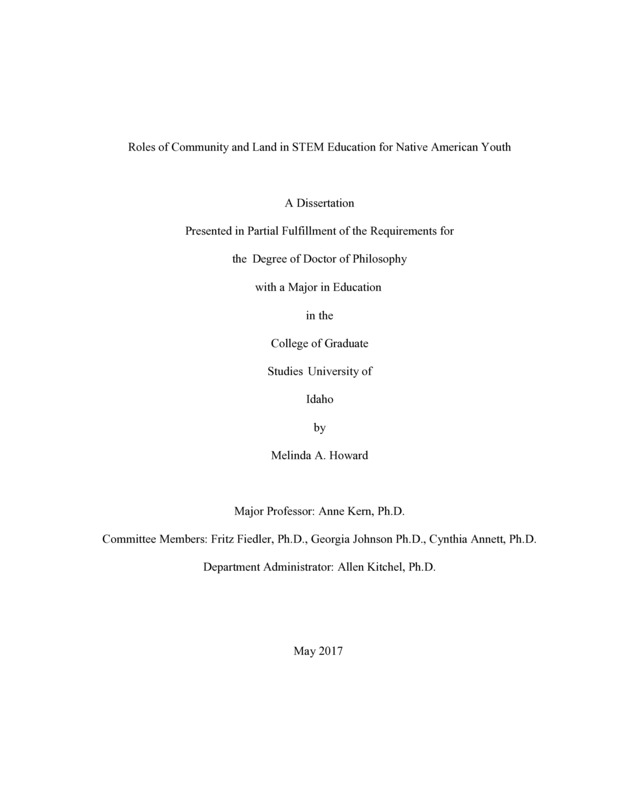The Roles of Community and Land in STEM Education of Native American Youth
HOWARD, MELINDA. (2017). The Roles of Community and Land in STEM Education of Native American Youth. Theses and Dissertations Collection, University of Idaho Library Digital Collections. https://www.lib.uidaho.edu/digital/etd/items/howard_idaho_0089e_11062.html
- Title:
- The Roles of Community and Land in STEM Education of Native American Youth
- Author:
- HOWARD, MELINDA
- Date:
- 2017
- Embargo Remove Date:
- 2018-02-28
- Keywords:
- Indigenous STEM
- Program:
- Curriculum & Instruction
- Subject Category:
- Science education
- Abstract:
-
In response to growing national interests to promote participation of Native Americans in STEM fields, the focus of this dissertation is to explore culturally effective means of science education for Native American youth. Provided in the context of a three-year summer STEM project conducted with tribal youth, Back to the Earth, themes of community and land-based science education are examined as ways of providing meaningful and authentic learning opportunities for Native youth. Specifically, this thesis reports how integrating community (natural and human) with place-specific and land-based learning opportunities into modern science education can be accomplished through honoring communal narratives and fostering community capitals that work to achieve tribal visions of stewardship and sustainability.
The concepts of land and community are examined through two studies. First, I use anti-oppressive inquiry to analyze my role as a curriculum designer, educator, and researcher during the first year of the Back to the Earth camp. Student inclusion of Bigfoot into a STEM activity provoked my recognition and appreciation of Indigenous knowledge systems, the role of communal narrative in Indigenous education, and the importance of displacing cognitive imperialism. Second, an exploration of youth science attitudes and aspirations resulting from activities with tribal Natural Resources scientists provides evidence that youth gain science-related social and cultural capital from these encounters. With many youth desiring to protect the land for the benefit of the community, some through careers with Natural Resources, these findings reinforce tribal educational goals of encouraging scholarship, membership, stewardship, and guardianship of its youth.
These studies add to the body of knowledge related to Indigenous science education by providing alternatives to the cognitive imperialism of mainstream Western education. Indigenous knowledge systems can be privileged in science education by honoring the role of natural and human communities in a land-centered approach. Including such approaches in science education could result in opportunities that increase Native American participation in STEM.
- Description:
- doctoral, Ph.D., Curriculum & Instruction -- University of Idaho - College of Graduate Studies, 2017
- Major Professor:
- Kern, Anne
- Committee:
- Fiedler, Fritz; Johnson, Georgia; Annett, Cynthia
- Defense Date:
- 2017
- Identifier:
- HOWARD_idaho_0089E_11062
- Type:
- Text
- Format Original:
- Format:
- application/pdf
- Rights:
- In Copyright - Educational Use Permitted. For more information, please contact University of Idaho Library Special Collections and Archives Department at libspec@uidaho.edu.
- Standardized Rights:
- http://rightsstatements.org/vocab/InC-EDU/1.0/

